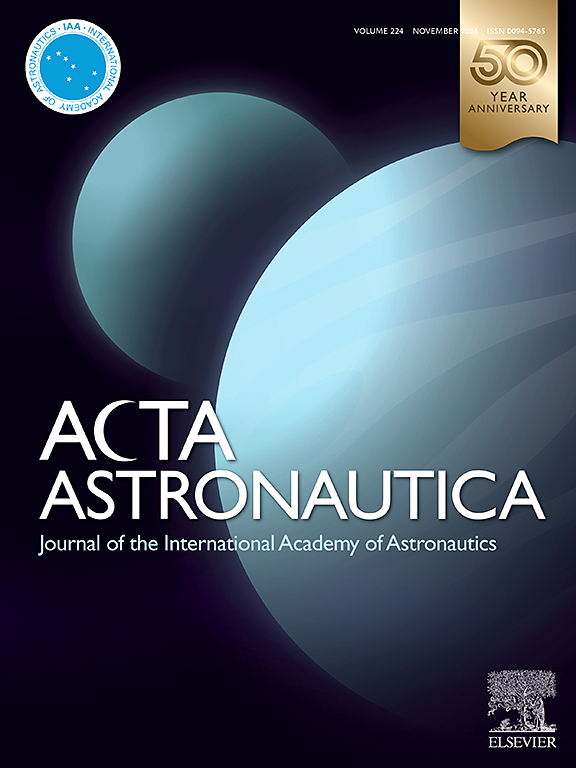高精度固体火箭入轨任务的燃烧-海岸-燃烧指向算法(BCBPA)
IF 3.4
2区 物理与天体物理
Q1 ENGINEERING, AEROSPACE
引用次数: 0
摘要
本文讨论了一种用于轨道插入任务的固体火箭制导算法。提供连续、平稳的制导指令以满足末五轨道要素和推进剂耗尽约束是需要解决的主要难题。当需要高精度时,初始状态和火箭发动机参数的弥散也需要解决。为了同时解决上述问题,本文通过在已建立的指向算法(PA)中引入Burn-Coast-Burn (BCB)模式,提出了一种Burn-Coast-Burn指向算法(BCBPA)。通过增加滑行时间作为新的控制参数,将制导问题转化为二级固体火箭的能量管理问题。随后,提出了一种N-BCBPA来解决多级固体火箭的能量管理问题,从而在该BCBPA失效时提供收敛制导命令。基于递归算法,N-BCBPA将n级固体火箭制导问题在BCB模式下转化为N-1个子问题,并依次求解,从而提高了BCBPA对离散的鲁棒性。仿真结果表明,N-BCBPA能够在满足推进剂耗尽约束的情况下将两级固体火箭引导至目标轨道,并且具有比BCBPA更好的抗弥散鲁棒性。本文章由计算机程序翻译,如有差异,请以英文原文为准。
A Burn-Coast-Burn Pointing Algorithm (BCBPA) for high-precision orbit insertion missions of solid rockets
This paper discusses a solid rocket guidance algorithm applied to orbit insertion missions. Providing continuous and smooth guidance commands to satisfy both terminal five orbit elements and propellant exhaustion constraints is the main difficulty to be solved. Dispersions in initial states and rocket engine parameters are also necessary to be addressed when high-precision is required. To simultaneously address the above issues, this paper proposes a Burn-Coast-Burn Pointing Algorithm (BCBPA) by introducing a Burn-Coast-Burn (BCB) mode in the well-established Pointing Algorithm (PA). By adding a coasting time as a new control parameter, the guidance problem is then converted to an energy management issue for a two-stage solid rocket. Subsequently, an N-BCBPA is proposed to address energy management issues for multi-stage solid rockets, thus providing converged guidance commands when the presented BCBPA fails. Based on a recursive algorithm, the N-BCBPA transforms the guidance problem of N-stage solid rockets into N-1 sub-problems under the BCB mode and solves them in order, thereby improving the robustness of the BCBPA against dispersions. Numerical simulations verify that the BCBPA is capable of guiding a two-stage solid rocket to the target orbit while satisfying propellant exhaustion constraints, and the N-BCBPA shows better robustness against dispersions than the BCBPA.
求助全文
通过发布文献求助,成功后即可免费获取论文全文。
去求助
来源期刊

Acta Astronautica
工程技术-工程:宇航
CiteScore
7.20
自引率
22.90%
发文量
599
审稿时长
53 days
期刊介绍:
Acta Astronautica is sponsored by the International Academy of Astronautics. Content is based on original contributions in all fields of basic, engineering, life and social space sciences and of space technology related to:
The peaceful scientific exploration of space,
Its exploitation for human welfare and progress,
Conception, design, development and operation of space-borne and Earth-based systems,
In addition to regular issues, the journal publishes selected proceedings of the annual International Astronautical Congress (IAC), transactions of the IAA and special issues on topics of current interest, such as microgravity, space station technology, geostationary orbits, and space economics. Other subject areas include satellite technology, space transportation and communications, space energy, power and propulsion, astrodynamics, extraterrestrial intelligence and Earth observations.
 求助内容:
求助内容: 应助结果提醒方式:
应助结果提醒方式:


